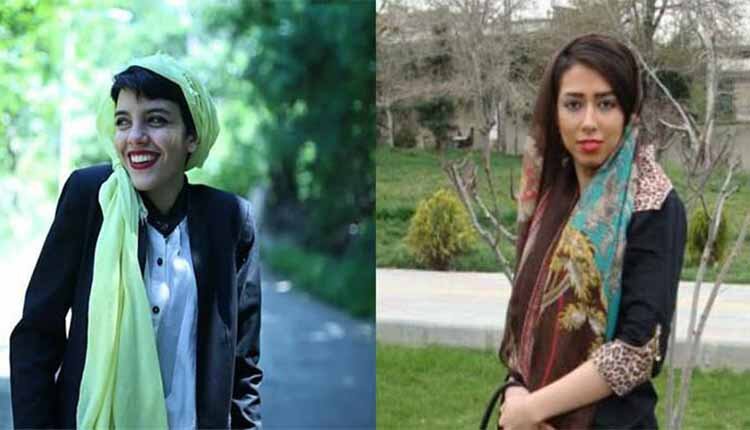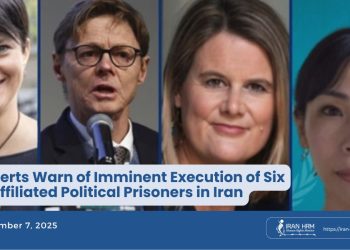Iran’s judiciary convicted at least 24 Iranian protesters on vaguely defined national security charges, Human Rights Watch said in a November 5 statement.
Their prison sentences ranged from six months to six years.
They were among more than 50 people arrested on August 2 during a protes ignited by anger over economic hardships, soaring unemployment and and corruption.
According to HRW, on October 28, authorities also arrested a human rights lawyer who had been convicted to three years in prison for reporting a protester’s death in detention.
Less than a year ago, attorney Mohammad Najafi was advocating for a young client who died under suspicious circumstances in an Iranian detention center. Nine months later, In “reprisal for exposing Heidari’s death in custody” and “reporting that his body bore marks of torture” and other ill-treatment, including cuts and bruises, Najafi was sentenced to three years in prison and 74 lashes on the charges of “disturbing the state” and “publishing falsehoods.”
“The rulings against me, Ali Bagheri and Abbas Safari were upheld (by the Appeals Court) without any changes: One year and 74 lashes for ‘disturbing the state,’ and two years for ‘publishing falsehoods,’” Najafi wrote in a Facebook post on October 18, 2018.
“The sentences against the other defendants, including six of my clients, were suspended for five years,” he added.
Najafi and Safari began their prison sentences in Arak’s Central Prison on October 28.
The court also sentenced 10 other protesters who were arrested during the December and January protests on charges such as disturbing public order and publishing false information to prison terms ranging from one to three years.
“Iranian government officials repeatedly advertise to the world that the repeated protests in the country signal that there are real freedoms in Iran, while these same protestors languish in prison for years,” said Michael Page, deputy Middle East director at Human Rights Watch. “Prosecuting peaceful protesters will only add fuel to Iranians’ boiling frustration and discontent with the situation.”
HRW reported that prosecutors charged at least three Iranian protesters with “assembly and collusion against national security” due to “participating in a protest without a permit that disrupted public order.” In the sentencing of at least two people, including Saba Kordafshari, 19, the evidence prosecutors presented was solely their social media posts reporting on the protest.
The two young women were sentenced each to one year in prison.
Yasamin Ariani, and Saba Kord Afshari, were lingering in limbo in Qarchak Prison in Varamin since the time of their arrest. They have been transferred from Qarchak to Evin Prison after their sentence was issued.
Yasamin Ariani was arrested in August along with several other young men and women in Tehran. After being apprehended, they posted a clip on the internet from inside the State Security Force van, identifying themselves and asking for help.
Yasamin Ariani’s mother said her daughter was arrested outside the City Theatre in Tehran while she was trying to help a lady brutalized by the police.
HRW said that prosecutors and prison officials denied the detainees access to a lawyer throughout the investigation and the trial and pressured them to plead guilty.
Iran’s judiciary has issued a list of 20 state-approved lawyers that detainees accused of “national security crimes”, the type of charge that’s usually issued against activists and dissidents, must choose from for legal representation.
On July 31, a wave of protests began in the city of Esfahan and quickly spread to other cities, including Karaj in Alborz province and Tehran, the capital. On August 3, a protesters identified by social media accounts as Reza Otadi was shot and killed during protests in Karaj. Authorities announced the establishment of a special committee to investigate his death, consisting of the Revolutionary Guards, police counterintelligence units, and a prosecutor, but have yet to disclose their findings.
Under international law, everyone has the right to freedom of expression and peaceful assembly, as guaranteed under the International Covenant on Civil and Political Rights (ICCPR), to which Iran is a party. The United Nations Basic Principles on the Use of Force and Firearms by Law Enforcement Officials provide that security forces should apply nonviolent means before resorting to the use of force. Whenever the lawful use of force is unavoidable, law enforcement officials should use restraint and act in proportion to the seriousness of the offense and minimize injury.
Torture and cruel, inhuman, or degrading treatment are banned at all times, and evidence obtained by torture or other coercion may not be submitted as evidence in a trial. The ICCPR also guarantees the right to a fair criminal trial, including to be informed promptly of the nature and cause of the charges; to have adequate time and facilities to prepare a defense; to communicate with counsel of one’s choosing; to be present at the trial; and to examine the prosecution’s witnesses.
“Countries that engage with Iran should press authorities for independent investigations into the proliferating number of abuses committed by Iran’s repressive intelligence and security apparatus,” Page said.







